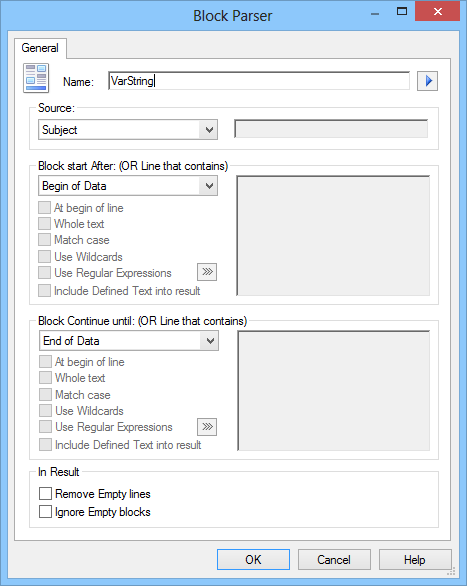Block Parser
Block-by-block parsing is used to parse data from source text with search data block beginning and end conditions. Block may contain several lines.

Name
Set name of the variable data to be parsed in.
Source
Set the source text data to be parsed from.
Start After
Set condition for beginning of the block to be parsed. The following operation modes are possible:
Begin of Data
The block starts at the beginning of the data source.
Defined Text
The block starts after the specified text.
At begin of line
Enables checking that the block beginning found is in beginning of a line
Whole Text
Enables comparing mode in which defined text must completely coincide with the beginning of the block.
Match Case
Enables case-sensitive search for the block beginning.
Use Wildcards
Enables search for the block beginning using wildcards.
Use Regular Expressions
Enables search for the block beginning using regular expressions.
Include Defined Text into Result
Enables adding defined text to the beginning of the block parsed.
Block Continue Until
Set block end condition. The following operation modes are possible:
End of Data
The block ends at the end of a text source.
Defined Text
The block ends before the text specified.
Defined Text or End of Source
The block ends before the text specified. If this text not found the blocks ends at the end of source.
At begin of Line
Enables checking that the block beginning found is in beginning of a line.
Whole Text
Enables comparing mode in which defined text must completely coincide with the end of the block.
Match Case
Enables case-sensitive search for the block end.
Use Wildcards
Enables search for the block end using wildcards.
Use Regular Expressions
Enables search for the block end using regular expressions.
Include Defined Text into Result
Enables adding defined text to the end of the block parsed.
Remove Empty Lines
Enables empty lines deleting in the data parsed.
Ignore Empty Blocks
Enables skipping of empty blocks.
See also
